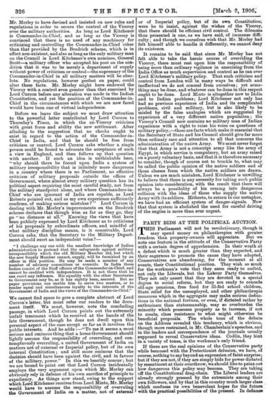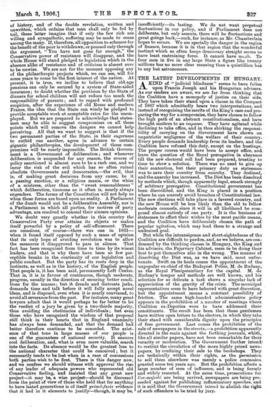PARTY BIDS AT THE POLITICAL AUCTION. T HIS Parliament will not
be revolutionary, though it may spend money on philanthropies with greater freedom than property-owners will appreciate. But we note one feature in the attitude of the Conservative Party with a certain degree of apprehension. In their wrath at a defeat which is much greater than they expected, and their eagerness to promote the cause they have adopted, Conservatives are abandoning, for the moment at all events, their Constitutional position. They wish so much for the workman's vote that they seem ready to outbid, not only the Liberals, but the Labour Party themselves. They not only assert that they are devoted in a special degree to social reform, but they are ready to concede old-age pensions, -free food for ill-fed school children, State relief for the unemployed, and other philanthropic measures which in the aggregate may make serious deduc- tions in the national fortune, or even, if dictated rather by enthusiasm than statesmanship, may so overburden the minority which possesses property as to increase, if not to create, class resistance to what might otherwise be beneficial proposhls. The whole tone of the debate on the Address revealed this tendency, which is obvious, though more restrained, in Mr. Chamberlain's speeches, and in the leaders and correspondence of the journals usually supposed to reveal Conservative ideas. Codlin, they hint in a variety of tones, is the workman's only friend.
If these are the real opinions of the Conservative party while bemused with the Protectionist delusion, we have, of course, nothing to say beyond an expression of faint surprise; but if they are not, if they are simply bids for power dictated by resentment at their overthrow, we should like to point out how dangerous this policy may become. They are taking off the Constitutional drag-chain. The Liberal leaders are already strongly pressed by the extremists among their own followers, and by that in this country much larger class which confuses its own benevolent hopes for the future with the practical possibilities of the present. In defiance of history, and of the double revelation, written and unwritten, which ordains that man shall only• be fed by toil, these latter imagine that if only the few rich are willing and sympathetic, suffering may be made to cease among the many. If, therefore, all opposition to schemes for the benefit of the poor is withdrawn, or pressed only through the argument, "You have not gone far enough," the Conservative power of resistance will disappear, and the *hole House will stand pledged to legislation which in the absence alike of resistance and of criticism is almost pure to be unwise. We are not for the moment opposing any of the philanthropic projects which, we can see, will for some years to come be the first interest of the nation. At present, it is true, we incline to believe that old-age pensions can only be secured by a system of State-aided insurance; to doubt whether the provision by the State of dinners for school children will not reduce too much the responsibility of parents ; and to regard with profound suspicion, after the experience of old Rome and modern France, the idea that the State can wisely be pledged to provide acceptable work at acceptable rates for the unem- ployed. But we are prepared to acknowledge that states- men may be able to suggest compromises on all these points which will remove the dangers we cannot help perceiving. All that we want to suggest is that if the two permanent parties of the State, in their eagerness to outbid one another, agree in advance to certain gigantic philanthropies, the development of those com- promises will be nearly impossible. The British Govern- ment is a Government of deliberation ; and whenever deliberation is suspended for any reason, the course of policy sanctioned is almost sure to be a rash one, and we incur the risk of the evil which has so often ruined absolute Governments and democracies,—the evil, that is, of making great decisions from any cause, be it a passing emotion, or a religious mania, or the whim of a mistress, other than the "sweet reasonableness" which deliberation, tiresome as it often is, nearly always engenders. The forms of the Constitution will not help us when these forms are based upon no reality. A Parliament of the dumb would not be a deliberative Assembly, nor is a Parliament in which all parties, for motives of party advantage, are resolved to conceal their sincere opinions.
We doubt very greatly whether in this country the Conservative Party ever attains its objects or makes itself powerful by a policy of self-effacement. There are occasions, of course—there was one in 1881— when it found itself opposed by such a mass of opinion that its only hope of avoiding revolution was to allow the measures it disapproved to pass in silence. That fact has been recognised from time to time by its wisest leaders, and that is why there have been so few per- ceptible breaks in the continuity of our legislation and public conduct. But the party has its roots deep in the instincts, as well as in the history, of the English people. That people is, it has been said, permanently Left Centre. That is, it is in favour of continuous, though moderate, progress, usually in the direction of securing better condi- tions for the masses ; but it dreads and distrusts jerks, demands time and talk before it will fully accept novel ideas, and is disposed, even when it is nearly convinced, to avoid all severance from the past. For instance, many great lawyers admit that it would perhaps be far better to let the verdict of a jury be given by a two-thirds majority, thus avoiding the obstinacies of individuals ; but even those who have recognised the wisdom of that proposal still think in their hearts that in England unanimity has always been demanded, and that the demand had better therefore continue to be conceded. The exist- ence of that, tone in large masses of our people is one of the guarantees of national security. It ensures cool deliberation, and, what is even more valuable, search into the facts. Its absence would be the greatest loss to the national character that could be conceived ; but it necessarily tends to be lost when in a race of concessions both parties wish to be first. There is this danger now, and we confess we should witness with approval the rise of any leader of adequate powers who represented old Conservative feeling, and insisted that any great new project—it may be, a wise project—should be discussed from the point of view of those who hold that for anything to have lasted generations is of itself prima-facie evidence that it had in it elements to justify—though, it may be, insufficiently—its lasting. We do not want perpetual, fluctuations in our policy, and if Parliament does not deliberate, but only assents, there will be fluctuations and great goings back,—such, for instance, as Mr. Chamberlain hopes to secure. We see specially the danger in the region of finance, because it is in that region that the wonderful instinct which so often keeps democracy straight seems to have least restraining force. It cannot have mt.ch. To four men in five in any large State a figure like twenty millions has no more clear meaning than a quintillion has to any but astronomers.















































 Previous page
Previous page